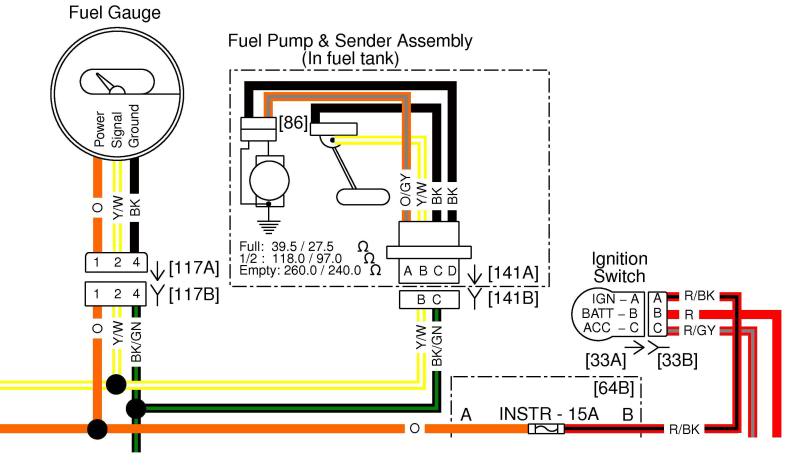Gas Gauge Ghosting You? Decoding the Fuel Sending Unit Saga
Ever glanced at your gas gauge, only to be met with a reading that seems to defy the laws of physics? One minute you’re cruising with a full tank, the next you’re supposedly running on fumes, even though you just filled up. This maddening experience is a classic symptom of a faulty fuel sending unit, a tiny component with the power to wreak havoc on your road trip plans. So, what’s the deal with this enigmatic device, and how can you conquer its quirks?
The fuel sending unit, or fuel level sensor as it's sometimes called, is like the messenger between your fuel tank and your dashboard. It's submerged in the tank, constantly monitoring the fuel level and sending signals to the gauge. Imagine it as a tiny, tireless informant, whispering secrets about your fuel situation. But when this informant starts sending garbled messages, things can get complicated.
This crucial component has been around since cars began sporting fuel gauges. Early versions were relatively simple, relying on a float connected to a variable resistor. As the fuel level changed, the float moved, adjusting the resistance and thus the gauge reading. Modern sending units often utilize more sophisticated technologies, but the basic principle remains the same: accurately translate the amount of fuel in your tank into a visual representation you can understand. A properly functioning sending unit is paramount – imagine the stress of constantly guessing how much fuel you have left! Nobody wants to end up stranded on the side of the road, all thanks to a miscommunicating gauge.
Troubleshooting a problematic fuel sending unit can involve a bit of detective work. Common issues include a sticking float, a faulty resistor, damaged wiring, or even a corroded connector. Each of these issues manifests in different ways, from erratic needle fluctuations to a completely dead gauge. Identifying the specific culprit is the key to effective repair.
While some might be tempted to ignore a slightly inaccurate fuel gauge, addressing the issue promptly can prevent more serious problems down the line. Running out of gas can damage your fuel pump, and a faulty sending unit can sometimes be a symptom of a larger problem within the fuel system. Taking the time to diagnose and fix a fuel sending unit problem can save you money and headaches in the long run.
One common issue is a sticking float, often caused by debris or sediment in the fuel tank. This can result in inaccurate readings, usually showing less fuel than is actually present. A faulty resistor within the sending unit can cause erratic needle movements or a completely unresponsive gauge. Corroded or damaged wiring can also disrupt the signal between the sending unit and the gauge. Each of these problems requires a different approach, ranging from simple cleaning to complete replacement of the sending unit.
There are several benefits to addressing fuel sending unit issues. First, accurate fuel readings eliminate the anxiety of guessing how much fuel you have left. Second, it can prevent damage to your fuel pump caused by running out of gas. Finally, diagnosing and fixing a sending unit problem can reveal other potential issues within the fuel system, allowing you to address them proactively.
Troubleshooting typically involves inspecting the wiring and connectors for damage, testing the sending unit's resistance with a multimeter, and checking the fuel tank for debris. A step-by-step guide is readily available online and in many automotive repair manuals.
Advantages and Disadvantages of DIY Troubleshooting
| Advantages | Disadvantages |
|---|---|
| Cost savings | Potential for misdiagnosis |
| Sense of accomplishment | Risk of further damage |
Best practices include disconnecting the battery before working on the fuel system, using the correct tools and safety procedures, and consulting a repair manual for specific instructions for your vehicle make and model.
Frequently Asked Questions about fuel sending unit problems cover topics such as common symptoms, diagnostic procedures, and replacement options. Tips and tricks often include checking the fuel pump relay and fuse, inspecting the ground wire connection, and using a fuel additive to clean the fuel system.
In conclusion, a malfunctioning fuel sending unit can be a frustrating experience, but understanding its function, common problems, and troubleshooting techniques can empower you to take control of the situation. Addressing the issue promptly can save you money, prevent further damage, and restore the peace of mind that comes with knowing exactly how much fuel you have left. Don't let a faulty sending unit ruin your next road trip – take the time to diagnose and fix the problem, and get back to enjoying the open road with confidence.

Fuel Gauge Sender Unit | YonathAn-Avis Hai

Fuel Pump Wire Gauge | YonathAn-Avis Hai

Fuel Gauge Sending Unit Wiring Diagram | YonathAn-Avis Hai

Gas Gauge Not Working On 1974 Camaro | YonathAn-Avis Hai

DIAGRAM Harley Davidson Motorcycle Wiring Diagrams Fuel Pump | YonathAn-Avis Hai

Hooking Up A Fuel Gauge at Terrance Brown blog | YonathAn-Avis Hai

Can Fuel Gauge Be Fixed at Christy Taylor blog | YonathAn-Avis Hai

Fuel Gauge Wire Diagram | YonathAn-Avis Hai

How To Check Fuel Gauge And Sender | YonathAn-Avis Hai

Cj7 Fuel Gauge Troubleshooting | YonathAn-Avis Hai

Wiring Diagram For Hydraulic Dump Trailer | YonathAn-Avis Hai

Boat Fuel Sender Wiring Gauge | YonathAn-Avis Hai

Buy Boat Fuel Sending Unit 240 | YonathAn-Avis Hai

Fuel Gauge Sending Unit Plug at Petrina Lamb blog | YonathAn-Avis Hai

Club Car Wiring Diagram Fuel Gauge | YonathAn-Avis Hai